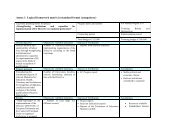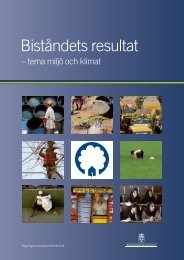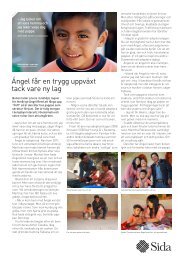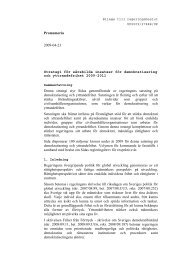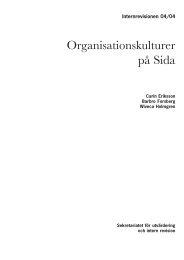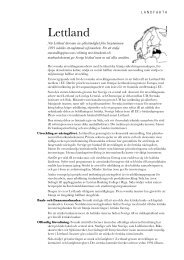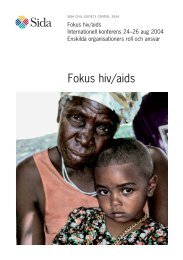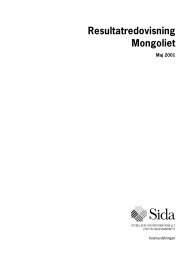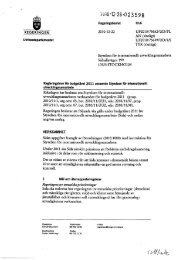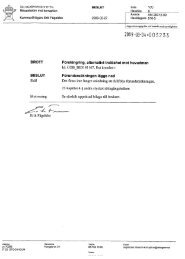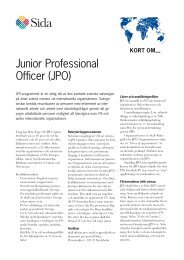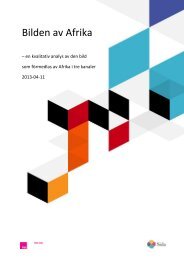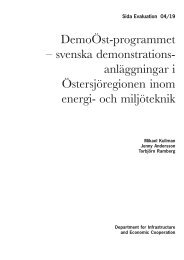Mid-Term Review of the AGIR Programme - Sida
Mid-Term Review of the AGIR Programme - Sida
Mid-Term Review of the AGIR Programme - Sida
Create successful ePaper yourself
Turn your PDF publications into a flip-book with our unique Google optimized e-Paper software.
2 F I N D I N G S<br />
tendency for <strong>the</strong> government to be held “accountable – for its decisions, policies and<br />
use <strong>of</strong> resources – to donors ra<strong>the</strong>r than to citizens and Parliament”. 19<br />
Acknowledging that <strong>the</strong>re is a weakness in Mozambican civil society domestic accountability,<br />
some donors have been supporting civil society capacity development<br />
initiatives. Examples are <strong>the</strong> Civil Society Support Mechanism (CSSM/MASC),<br />
funded by DFID (Development Fund for International Development), Irish Aid and<br />
USAID (United States International Development Agency); support to key research<br />
advocacy and research organisations, such as <strong>the</strong> Center for Public Integrity (CIP),<br />
<strong>the</strong> Institute for Economic and Social Studies (IESE) and <strong>the</strong> League <strong>of</strong> Human<br />
Rights (LDH).<br />
The Swedish Embassy, as reflected in its current “Swedish Cooperation Strategy with<br />
Mozambique 2008-2012”, is part <strong>of</strong> this growing awareness about weaknesses within<br />
Mozambique’s civil society. <strong>AGIR</strong>, and its focus on <strong>the</strong> capacity streng<strong>the</strong>ning <strong>of</strong><br />
selected CSOs who play a pivotal role in streng<strong>the</strong>ning <strong>the</strong> capacity <strong>of</strong> citizens and<br />
citizen’s organisations to meaningfully (and actively) participate in and influence<br />
local and national agendas, is intended to address many <strong>of</strong> <strong>the</strong> key development,<br />
democratic governance issues, and challenges currently faced in <strong>the</strong> country. These<br />
issues include <strong>the</strong> participation <strong>of</strong> civil society in governance and development, rights<br />
recognition and enforcement, challenges posed by increasing exploitation <strong>of</strong> natural<br />
resources, <strong>the</strong> promotion <strong>of</strong> women’s rights, and <strong>the</strong> streng<strong>the</strong>ning <strong>of</strong> civil society<br />
organisations capacities and aid effectiveness.<br />
2.2 RELEVANCE – PERCEPTIONS OF <strong>AGIR</strong><br />
WITHIN MOZAMBIQUE<br />
Despite strong government resolve to improve <strong>the</strong> socioeconomic well-being <strong>of</strong> ordinary<br />
Mozambicans, many still question <strong>the</strong> strength and <strong>the</strong> role <strong>of</strong> civil society in<br />
this poverty reduction process within Mozambique. While <strong>the</strong>re is a strong history <strong>of</strong><br />
service delivery by CSOs, dialogue between <strong>the</strong>se organisations and <strong>the</strong> government<br />
remains challenged. Systems <strong>of</strong> transparent governance structures and accountability<br />
mechanisms remain weak. The situation for historically marginalised groups also<br />
remains problematic. With little ability to speak for <strong>the</strong>mselves or influence decisionmakers,<br />
<strong>the</strong>se marginalised groups are especially reliant on access to, and support<br />
from, civil society organisations to help <strong>the</strong>m express <strong>the</strong>ir needs and to build <strong>the</strong><br />
capacities <strong>of</strong> <strong>the</strong>ir communities to respond with a collective voice. At <strong>the</strong> same time,<br />
19 Streng<strong>the</strong>ning Civil Society – Enhancing Democratic Governance, p.3, 2010. <strong>Sida</strong>.<br />
31



